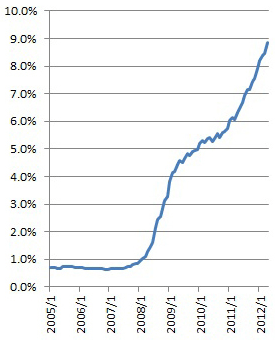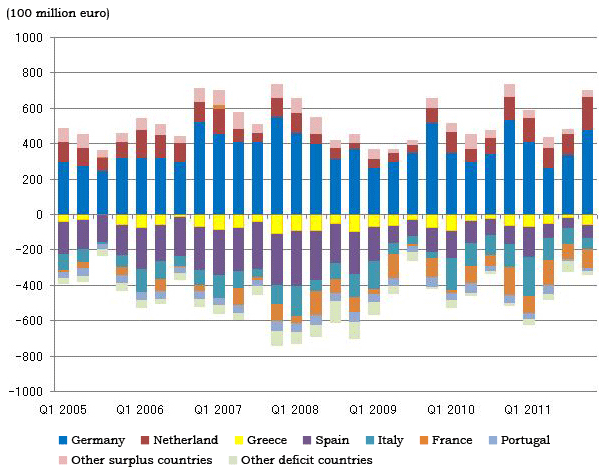The New Democracy (ND), a party calling for fiscal discipline and insisting on staying in the euro zone, won the June 17 repeat election in Greece, claiming the majority of parliamentary seats together with the Panhellenic Socialist Movement (PASOK) which had been pursuing the same line as a coalition partner. The outcome is a desirable one from the viewpoint of the international financial community.
Greek election ends but the euro crisis continues
This, however, will not mitigate the seriousness of the European debt crisis in any significant way. Favorable market sentiment brought on by the election results in Greece was short-lived as it was followed quickly by bad news from Spain, where it was announced that the banks' bad debt rate hit 8.8% in April 2012, the highest since the disclosure of such figures began in 1962 (Figure 1).
Besides, a solution to the Greek problem is nowhere in sight. Although Greece's political commitment to stay in the euro zone is a big step forward, the country's fiscal deficit remains as hefty as ever and its economy as bad as ever.
That is, Greece has managed to weather one crisis, only to meet another. And, depending on how euro zone countries respond, things may turn out far worse than just Greece breaking away. Indeed, there is no denying the possibility of the dissolution of the euro zone.
What can be said at the moment is that, in the face of the ongoing economic plight of Greece and Spain, it is becoming obvious that trying to fix the situation simply by imposing austerity measures is impracticable.
Attesting to this, some officials of the European Union (EU) are already referring to the possibility of renegotiating the bailout deal with Greece, and European leaders have put forward a proposal calling for concrete steps toward banking supervision and deposit insurance under a unified framework as if in time for the aggravation of the Spanish banking crisis.
Furthermore, there is growing understanding among EU member countries of the need to implement some growth policies as a means to promote fiscal discipline.
However, as I wrote in my previous article for this column, it is too optimistic to expect any groundbreaking growth policies to come out readily. The biggest focal point at the moment is the policy decisions that will be made at the EU summit held on June 28 and 29. In any event, it is hard to believe that the kind of policies that would prop up the Greek and Spanish economies and enable all member countries to enforce fiscal discipline will be implemented anytime soon.

Germany's current account surplus indicates its duty to help
The future course of events hinges on Germany. More specifically, the extent to which it will support Greece and Spain financially is a major factor that will determine how much time can be spent on restoring fiscal stability. Indeed, it is a duty for Germany as a member of the euro zone to provide such financial support.
This is obvious when we look at the current account balances of the euro zone countries (Figure 2). Germany is the largest surplus country followed by the Netherlands, whereas Greece and Spain have been chronically in deficit along with Italy and France.
This indicates a consistent pattern in the euro zone in which Germany and the Netherlands have surplus funds while Greece, Spain, Italy, and France have shortages. In order to facilitate the smooth flow of funds within the area, it is necessary to ensure the continuous flow of funds from Germany and the Netherlands, where money tends to gather, to Greece and Spain.
Prior to the crisis, financial institutions and financial markets functioned as a mechanism for ensuring the smooth flow of funds within the euro zone. However, now that the European financial markets have been paralyzed and banks are shying away from doing business with Greece and Spain, whether lending money or purchasing sovereign bonds, the only remaining way out is for the governments of Germany and the Netherlands to take the lead and act as a catalyst by channeling their surplus money to needy countries.
Fulfilling this role does not necessarily have to take the form of direct financial support from the German government to Greece and Spain. Funds may be channeled through the European Financial Stability Facility (EFSF) or a proposed banking union, or they may be provided in the form of loans from the European Central Bank or proceeds on the issuance of Eurobonds. Whatever form it may take, however, there is no difference in that unless Germany's surplus funds are channeled to cash-strapped Greece and Spain, the economies and people of these two countries will dry up.

Greek and Spanish problems are becoming a German problem
Since indebted countries such as Greece and Spain cannot raise funds on their own, how long Germany, the biggest surplus state, can hold out and keep on channeling its people's money to deficit states such as Greece, Spain, and Italy will, before long, become the core issue of the European sovereign debt problem.
The euro zone was formed by countries that differed greatly in economic status. That is, from the time of inception, it was destined that the euro zone economy could be sustained only with a continuous flow of money to fill in the gaps across member countries, and doomed to collapse when money ceases to flow.
In Japan, money flows from economically strong Tokyo to weaker rural regions in the forms of tax revenue allocations and subsidies from the central to local governments. This, however, is not an issue in Japan as we take it for granted. Indeed, people find it quite natural that money flows inside the country to fill in the economic gaps across different regions.
The same holds true for the euro zone. European countries integrated their economies and adopted the euro as their sole currency under a single, common philosophy. Thus, they cannot refuse to let their money flow to other member countries. If they do, then the euro zone would be unsustainable.
Therefore, providing massive financial support to Greece and Spain is not for the German people to accept reluctantly. Instead, it is their natural obligation, and they have no right to refuse. German taxpayers may find Greek people less diligent . Or they may find the plight of Spain nothing but a problem of its own making, reckoning that the mountains of bad debt held by Spanish banks are the consequence of the overly speculative housing investment boom. However, regardless of its feelings, Germany must support Greece and Spain because of its duty as a member of the euro zone.
The Greek and Spanish problems are now becoming a German problem. The euro zone would not be viable as a mechanism unless it is taken for granted that German taxpayers bail out indebted fellow member countries. Depending on how Germany behaves, the ongoing crisis may entail not only the defection of Greece but also the collapse of the euro zone.
Fiscal integration as the only way to prevent the collapse of the euro zone
In order to solve this fundamental problem, there is no other choice but to accelerate fiscal integration. The euro zone will remain unstable indefinitely if "good reasons" must be found to persuade German taxpayers to agree to financial support each time the need arises. However, now that the crisis has deepened to the point it is today, the only way out is to accelerate the integration process to complete the euro zone as a unified monetary and fiscal framework.
A little while ago, when the Greek debt crisis became serious, fiscal integration was advocated as the best among several policy options. At the time, however, it was talked about mostly as a dream scenario, one that would provide an ultimate solution—not only to the Greek problem but also to the inherent challenge of the euro zone—but not to be expected to materialize anytime soon in reality.
The situation in the euro zone, however, is now approaching the point where member economies must get to the heart of the problem and address it. Even if Greece manages to stay on for the time being, the turmoil in the financial markets will continue until market participants are convinced of Germany's commitment and the possibility of euro zone fiscal integration comes into sight.
* Translated by RIETI.
June 26, 2012 WEDGE Infinity website


